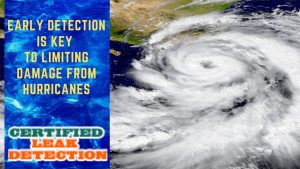It’s hurricane season in Florida once again! You’ve probably prepared your home and property as much as possible, but high winds, driving rain and the damage they cause are always a possibility. Although Certified Leak Detection specializes in locating leaks in swimming pools, spas, fountains, concrete slabs and underground plumbing, we’re widening our scope in this blog post to help you prevent water damage from exterior wall leaks – as well as underground pipes.
Finding a crack in a wall isn’t always easy
Even a small crack can cause big problems. As soon as water finds a gap, it will enter and expand it. That is why you should not leave any leak unrepaired. There are some leaks that you can locate easily, but others can be difficult to find. External wall leaks are among the latter. The Hurricane Retrofit Guide provides a helpful checklist of leak sources on walls that allows you to download and print out a PDF of the checklist for convenient use.
While we’re referring you to the checklist, it basically instructs you to carefully inspect any area where a pipe – such as an exterior water faucet or air conditioning pipes – enters the house. Ditto for light fixtures, dryer vents and caulking under windows.
The guide emphasizes that an exterior wall crack of any size can allow water to enter during the strong winds of a hurricane. A category 1 hurricane has winds starting at 74 mph, while a catastrophic category 5 storm packs winds of 157 mph or higher. Any exposed area that isn’t watertight presents a problem.
If you don’t fix the leaks, and there are too many cracks in the wall, it can saturate the wall system and intrude into your home’s interior. This can promote mold growth and – depending on the location of the cracks – warp wood floors and undermine other structural features. Fortunately, DIY repairs are relatively easy and inexpensive to make. Prevention is definitely preferable to paying to repair serious damage.
Hurricanes can do a number on pipes
Hurricanes can put a lot of strain on the drainage system. Despite Florida’s attempt to build storm-resilient pipelines, hurricanes can still do a number on pipes. Underground pipes can withstand twice the amount of water that they can pass and filter. However, the last major hurricane in Florida, Irma, overwhelmed these systems, and water overflowed into homes and streets.
Florida is not the only place whose water treatment centers failed. During Hurricane Harvey, around 3% of the Texan wastewater treatment centers in the Houston area failed, as well. This led to an outbreak of E. coli.
The problems a leak could cause if untreated
As mentioned earlier, hurricanes put a great amount of stress on the drainage system. Heavy rains and strong storms place a tremendous amount of pressure on the underground pipes, which can even cause the ground to shift, leading to leaks and ruptures in the pipes. If you don’t fix the leak at the earliest, it can cause many serious problems.
Also, when the rain water saturates the soil, it can cause the soil and rocks to shift, which strains your pipes and makes them vulnerable to leaks.
High winds can also shift the tree roots, which again can put stress on your plumbing system. In addition, dirt and debris can also enter your plumbing system, further compounding your problems.
When left undetected, these leaks can cause structural damage to your property – including compromise to the integrity of your home’s foundation, as well as health issues caused by mold and mildew.
Locating underground pipe leaks isn’t easy. You can only look for signs to suspect that there might be a leak somewhere. Some of the signs indicative of an underground leak include the following:
- A sudden increase in your water bill, even though your household use hasn’t increased.
- A sudden drop in water pressure.
- A continuous sound of running water.
- Unexplained wet areas in your yard.
Any of these signs warrant calling a professional to accurately locate the source of the leak. Ignoring the issue will only result in greater damage that’s even more costly to repair, not to mention the increased risk to health if mold is involved. Your homeowners insurance may cover part of the cost, but read your policy and ask your insurance agent to be certain you understand the terms of your coverage.
Again, early detection is key to limiting damage. Should you suspect trouble, Certified Leak Detection is experienced in leak detection and repair for Orlando, Longwood, Lake Mary, Sanford, Kissimmee, Clermont and Winter Springs. Trusted by homeowners and business owners throughout Central Florida, our team is ready to answer your call. Contact us for quick, reliable service.

